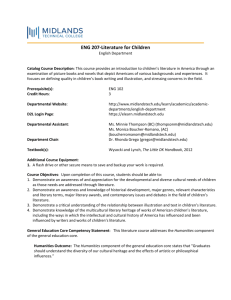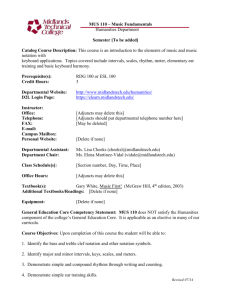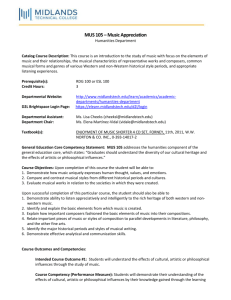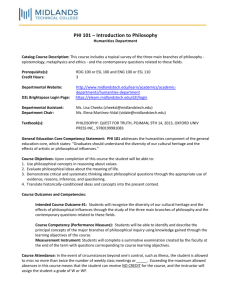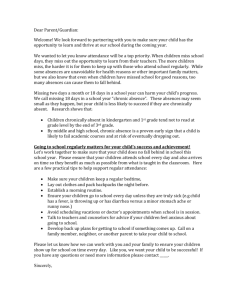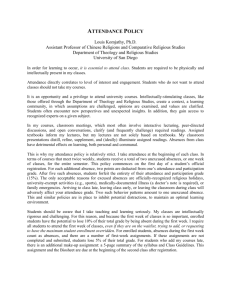ENG 101—English Composition I
advertisement
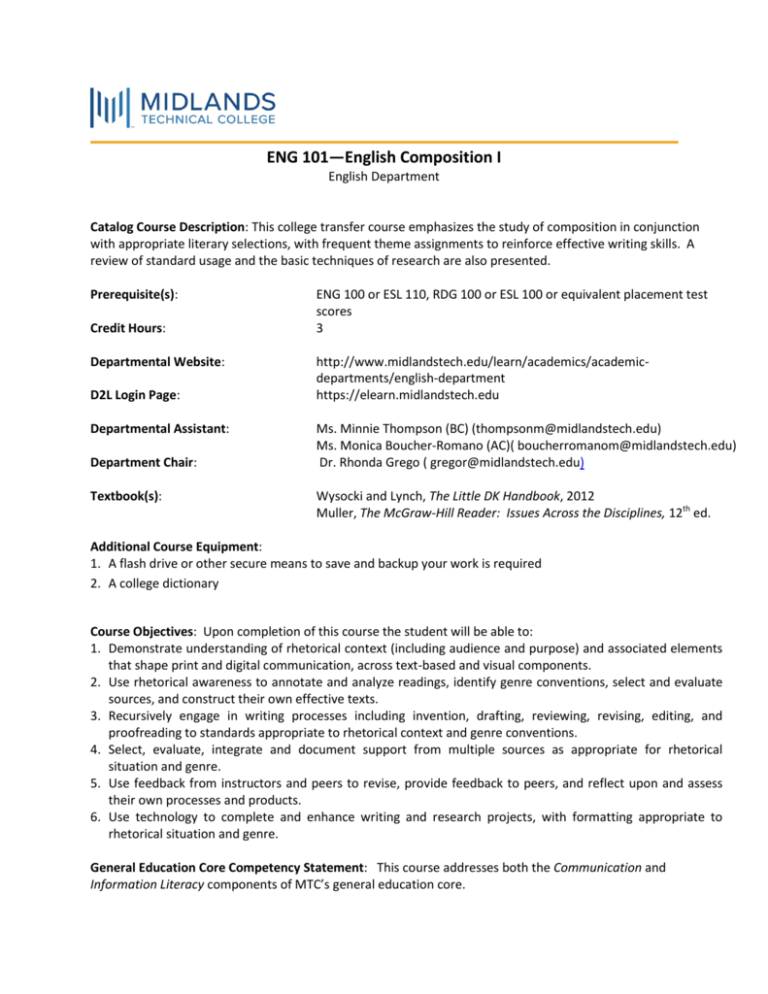
ENG 101—English Composition I English Department Catalog Course Description: This college transfer course emphasizes the study of composition in conjunction with appropriate literary selections, with frequent theme assignments to reinforce effective writing skills. A review of standard usage and the basic techniques of research are also presented. Prerequisite(s): Credit Hours: Departmental Website: D2L Login Page: Departmental Assistant: Department Chair: Textbook(s): ENG 100 or ESL 110, RDG 100 or ESL 100 or equivalent placement test scores 3 http://www.midlandstech.edu/learn/academics/academicdepartments/english-department https://elearn.midlandstech.edu Ms. Minnie Thompson (BC) (thompsonm@midlandstech.edu) Ms. Monica Boucher-Romano (AC)( boucherromanom@midlandstech.edu) Dr. Rhonda Grego ( gregor@midlandstech.edu) Wysocki and Lynch, The Little DK Handbook, 2012 Muller, The McGraw-Hill Reader: Issues Across the Disciplines, 12th ed. Additional Course Equipment: 1. A flash drive or other secure means to save and backup your work is required 2. A college dictionary Course Objectives: Upon completion of this course the student will be able to: 1. Demonstrate understanding of rhetorical context (including audience and purpose) and associated elements that shape print and digital communication, across text-based and visual components. 2. Use rhetorical awareness to annotate and analyze readings, identify genre conventions, select and evaluate sources, and construct their own effective texts. 3. Recursively engage in writing processes including invention, drafting, reviewing, revising, editing, and proofreading to standards appropriate to rhetorical context and genre conventions. 4. Select, evaluate, integrate and document support from multiple sources as appropriate for rhetorical situation and genre. 5. Use feedback from instructors and peers to revise, provide feedback to peers, and reflect upon and assess their own processes and products. 6. Use technology to complete and enhance writing and research projects, with formatting appropriate to rhetorical situation and genre. General Education Core Competency Statement: This course addresses both the Communication and Information Literacy components of MTC’s general education core. Communication Outcome: The Communication component of the general education core states: “Graduates should be able to generate and comprehend written and oral communication appropriate for a variety or audiences, purposes, and subjects.” Communication Competency: Students who use this course to satisfy the Communication core competency should be able to: 1. Understand how to read a variety of genres analytically 2. Understand how purpose and audience determine their choices as a writer 3. Write an argument supporting their own ideas and an analysis of another writer’s text 4. Write an effective in-class essay 5. Edit their own writing effectively Performance: Success on the Communication competency will be measured by the student’s performance on the portfolio of essays (including an in-class essay), and reading responses. Information Literacy Outcome: The Information Literacy component of the general education core states: “Graduates should be able to recognize a need for information, access the information effectively and efficiently using various mediums, critically select and evaluate information and incorporate it into their knowledge base, and present information in an appropriate format.” Information Literacy Competency: Students who use this course to satisfy the Information Literacy core competency should be able to: 1. Conduct academic research 2. Use secondary sources effectively and correctly Performance: Success on this competency will be measured by the student’s performance on assignments which require research. On-Campus Course Attendance: A. Students are expected to attend all classes. There are no excused absences. All absences are counted, regardless of the reason for the absence. Absences are counted from the first day of the semester session. Even when absent, students are responsible for all in-class work as well as out-of-class assignments due. Absence is not a valid excuse for turning in assignments late. Instructors are not obligated to repeat information or allow students to make up missed work. B. As noted above, there are no excused absences. But in the event of extenuating circumstances, such as illness, students are allowed a certain number of absences, depending on the length of the session: 14-week session 4 absences 10- or 12-week session 3 absences 7- or 5-week session 2 absences Fast Track session 0 absences C. Students are expected to be in class for the entire meeting period, with consequences for not doing so as follows: Students will be counted absent if they miss more than 10 minutes of any portion of the class. Students arriving after the class meeting start-time but within the first 10 minutes will be marked TARDY. If a student arrives after the instructor has taken roll and marked the student absent, but within the first 10 minutes of the period, it is the student’s responsibility at the end of that class meeting to request that the absence be changed to a tardy. The instructor is not obligated to change the roll at a later date. Three (3) tardies = one (1) absence. Online Course Attendance: Online course instructors follow instructions below. Online instructors will establish and communicate to students the guidelines for determining attendance in their online courses. Attendance should be established along the same guidelines as on-campus courses. Attendance can be counted in a variety of ways such as identifying how many missing assignments constitute an absence or identifying a certain percentage of assignments that must be turned in for the student to be in attendance the required amount of time. Instructors should withdraw any students who exceed the total number of allowed absences. Hybrid Course Attendance: Hybrid course instructors follow instructions below. Hybrid instructors will count both on ground and online absences (as defined in the course syllabus and policies) in determining total absences in a hybrid course. Instructors should establish and communicate to students what constitutes in class attendance and what constitutes online attendance. Instructors must be specific in what the online activities are and how they are graded. Students should Withdrawal: Should the maximum allowable absences be exceeded prior to midterm, a "W" will be submitted to the registrar to be recorded on the student's transcript. Should the maximum allowable absences be exceeded after midterm, a "W" will be submitted to the registrar if the student was passing the course at the time of withdrawal OR a "WF" will be submitted if the student was failing the course at the time of withdrawal. No Shows: If you register for a course and decide not to attend for any reason, you must complete a drop form and process through the student Records Office. You will not be automatically purged for nonattendance. If you do not submit a drop form, you will be responsible for course tuition and fees. By not officially dropping the course, you will incur a bill with the college that can only be addressed through the College’s Finance Office. The college’s refund policy and dates are posted each semester. Effective Spring 2015, the Student Ombudsman’s office will no longer be the initial point of contact for requesting No Shows to be processed. Students who incur a bill must contact the Finance Office. Administrative Drop Requests: A student requesting an Administrative Drop resulting from medical, death of family member, and other extenuating circumstances experienced while enrolled at Midlands Technical College should be directed to the Student Ombudsman’s office. Our policy dictates a request must be made no later than 30 days after the affected term. Supporting documentation is required and must be received before the request can be processed. Once the request form is received along with supporting documentation, it takes approximately three weeks for processing. As a result of an approved Administrative Drop Request, the student may be granted a refund of tuition and fees. According to College Procedure 3.10.1, students having to withdraw from college because of Military Deployment (active duty personnel) while enrolled must complete a withdrawal form and submit to the Records Office along with a copy of military orders. Disabilities Statement: The staff of Counseling and Career Services works to ensure that all educational programming and services are accessible to otherwise qualified students with disabilities. If you have a concern regarding the accessibility of websites, instructional materials, online courses and other electronic or information technology please contact Counseling and Career Services. It is the student's responsibility to selfdisclose as a student with a disability and to request accommodations prior to beginning a program or course. Please contact the staff of Counseling and Career Services at 803-822-3505 (AC) or 803-738-7636 (BC) or via email at disability@midlandstech.edu if you have any questions or concerns. D2L Brightspace Help: Online Learning Support Help Desk: Technical questions related to the operation and use of Desire 2 Learn can be answered from our Support Help Desk. A response will be provided within one business day. To login: use your MTC e-mail account username and password. (Student Username Example: georgeasmith) (Faculty Username Example: smithg) Desire 2 Learn Assistance Online: Technical questions related to the operation and use of Desire 2 Learn can also be answered by leaving the information by telephone at (803) 822-3561, or emailing D2LHelp@midlandstech.edu. A response will be provided within one business day. For MyMTC log-in issues please call 803-738-7888. Academic Dishonesty: The students of MTC have adopted the following Honor Code: As a member of the Midlands Technical College community, I will adhere to the college’s Student Code. I will act honorably, responsibly, and with academic integrity and honesty. I will be responsible for my own academic work and will neither give nor receive unauthorized or unacknowledged aid. I will behave courteously to all members of the MTC community and its guests and will respect college property and the property of others. The Student Code (Appendix I of the MTC Student Handbook) defines academic dishonesty, which includes, but is not limited to, cheating on tests, plagiarism, collusion, and falsification. Such actions will result in discipline. Cheating on tests includes: . Copying from another student’s paper. . Copying or presenting someone else’s work as your own. . Using unauthorized materials during a test. . Collaborating with any other person during a test without permission. . Knowingly obtaining, using, buying, or selling in whole or part the contents of any test. . Bribing any other person to obtain information about tests. . Substituting for another student, or permitting another student to substitute for you. Plagiarism is taking another person’s work and using it without giving the source credit in any graded assignment. The use of cell phones or other portable electronic devices for purposes of academic dishonesty in any form is strictly prohibited; students who violate this policy will be subject to the disciplinary procedures and sanctions outlined in the Student Code. For more information about academic dishonesty, see the Student Code. If you are suspected of cheating, your instructor will inform you. You may explain or refute the allegation. If your instructor still thinks the charges are founded, you will be referred to the Office of the AVP, SDS. Documentation is submitted to the Office of the AVP, SDS, by your instructor. You will then meet with either Dr. Holloway or Mr. Hayden. After the meeting, you will receive a letter with the sanction grade of zero (0) and any other sanctions deemed appropriate. You will have the right to file an appeal. Once the hearing and the notice of the right to appeal have been completed, the instructor will be notified to apply the sanction grade of zero (0). Course Grading: Grading Scale: 90-100 80-89 70-79 60-69 0-59 A B C D F Superior Work Good Work Average Work Below Average Work Unsatisfactory Work Accessibility The staff of Counseling and Career Services works to ensure that all educational programming and services are accessible to otherwise qualified students with disabilities. If you have a concern regarding the accessibility of websites, instructional materials, online courses and other electronic or information technology please contact Counseling and Career Services. It is the student's responsibility to self-disclose as a student with a disability and to request accommodations prior to beginning a program or course. Please contact the staff of Counseling and Career Services at 803-822-3505 (AC) or 803-738-7636 (BC) or via email at disability@midlandstech.edu if you have any questions or concerns. Classroom Rules/Other: See 1) Academic Affairs Student Guidelines and Expectations, and 2) English Department Student Responsibilities (on-campus, online, or hybrid as appropriate).
